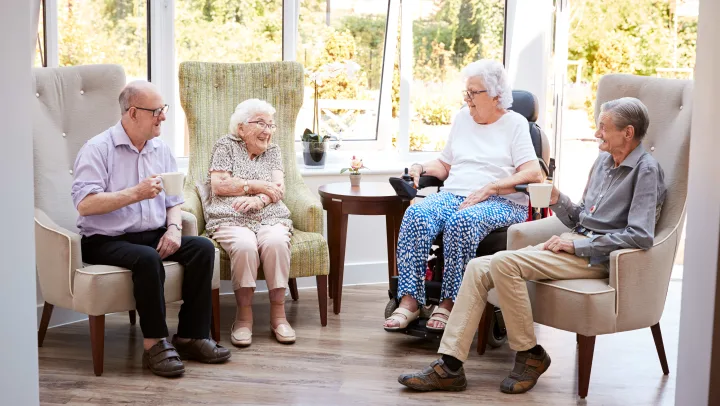Learn about new Memory Care techniques for cognitive well-being.
Learn about new Memory Care techniques for cognitive well-being.
Blog Article
The Role of Assisted Residing In Giving Specialized Take Care Of Dementia Patients
The arrangement of specialized care for dementia people within assisted living facilities is increasingly recognized as a vital part of efficient dementia monitoring. These atmospheres are developed to resolve the distinct cognitive and psychological challenges encountered by individuals with mental deterioration, using tailored assistance that promotes security and well-being.
Understanding Dementia Treatment Needs
Comprehending the care requirements of people with dementia is crucial for supplying effective assistance and enhancing their lifestyle. Dementia is a modern neurological problem that affects cognitive features such as memory, thinking, and communication. Individuals with dementia usually require support with day-to-day activities, personalized treatment strategies, and emotional support.
Efficient dementia care includes identifying the unique difficulties encountered by each person. This includes understanding the stages of mental deterioration, which can vary from mild cognitive impairment to sophisticated stages needing thorough assistance. Care needs may include support in handling day-to-day regimens, drug adherence, and maintaining social interactions to stop isolation.
Furthermore, sensory stimulation and familiar atmospheres can dramatically boost the health of people with mental deterioration. Caretakers have to be educated to recognize behavior adjustments and use approaches customized per individual's choices and previous experiences. Methods such as validation therapy and reminiscence can aid connect properly and cultivate a feeling of security.
Inevitably, efficiently resolving the treatment requirements of individuals with dementia calls for a thoughtful technique, continuous training for caretakers, and a commitment to maintaining self-respect and respect throughout the caregiving process.
Advantages of Assisted Living

Assisted living advertises social communication amongst homeowners, cultivating a feeling of community and belonging. Engaging with peers can alleviate feelings of isolation, which are common in those living with dementia.
Furthermore, many nursing home provide support with everyday activities, such as medicine administration, bathing, and meal preparation. This support permits homeowners to keep their independence while ensuring their wellness and health are focused on. Eventually, assisted living works as a useful resource, balancing treatment and freedom for people with mental deterioration and their households.

Specialized Programs and Tasks
(Charlotte Alzheimer's Care)Recognizing the distinct requirements of individuals with dementia, many nursing home carry out specific programs and activities developed to enhance cognitive feature and advertise general wellness. These programs typically include cognitive excitement tasks that engage locals in memory games, problems, and memory therapy, which encourages the sharing of individual tales and past experiences.
In addition, art and music treatment play considerable roles in promoting creativity and psychological expression (Assisted Living). Involving locals in paint, crafting, or music sessions can give restorative advantages, assisting to lower stress and anxiety and boost mood. Exercises, such as gentle workouts and dancing sessions, are likewise critical, as they promote flexibility and physical health while urging social interaction amongst residents
Structured day-to-day routines are commonly established to give a sense of stability and predictability for people with dementia. These routines can consist of arranged dish times, group tasks, and individualized care plans that deal with individual rate of interests and capacities. By creating an enhancing setting full of tailored activities, helped living centers not just enhance the high quality of life for mental deterioration people but also promote a feeling of area and belonging.
Educated Staff and Support
(Memory Care Charlotte)In assisted living centers, the presence of skilled staff is vital for offering reliable support to individuals with dementia. These experts have specialized understanding and abilities to address the special demands of locals, guaranteeing their safety and security, comfort, and wellness. Team members get training in mental deterioration care, that includes recognizing the development of the disease, acknowledging behavior changes, and employing efficient interaction strategies.
Additionally, skilled team are equipped to execute tailored treatment strategies tailored to each local's choices and capacities. This customized approach fosters a sense of autonomy and dignity, enabling citizens to take part in purposeful tasks that enhance their high quality of life. The personnel likewise play a crucial duty in keeping track of health and wellness and wellness, quickly determining any type of modifications in condition that may require clinical attention.
In addition to direct care, trained staff provide psychological assistance to citizens, assisting to ease sensations of confusion and anxiety that frequently accompany dementia. Their thoughtful strategy develops a nurturing environment where residents feel valued and recognized - Memory Care. Eventually, the know-how and commitment of qualified staff are indispensable in supplying detailed care that meets the intricate requirements of individuals living with mental deterioration in assisted living settings
Family Participation and Resources
Household involvement plays a substantial function in the care of people with mental deterioration in nursing home. Involving relative in the treatment process not just enhances the psychological wellness of the resident yet additionally cultivates a Get the facts joint environment where care plans can be tailored to specific requirements. Family members can offer valuable insights into the preferences, background, and habits of their enjoyed ones, which can notify caretakers and result in even more customized treatment methods.
In addition, helped living centers typically supply resources for households, such as support groups and instructional workshops. These resources can assist family members understand dementia, boost communication techniques, and create coping mechanisms. Involvement in these programs can encourage member of the family, furnishing them with the devices necessary to support their liked ones properly.
Additionally, routine interaction in between family members and staff is important. This recurring discussion allows families to remain educated concerning their loved one's development and any kind of adjustments in care plans. Eventually, a solid collaboration in between families and assisted living facilities promotes an atmosphere of depend on and understanding, making certain that people with mental deterioration receive the specialized care they are worthy of while preserving their household links.
Final Thought
In final thought, assisted living centers play an essential function in addressing the unique requirements of dementia people with personalized treatment and support. Ultimately, assisted living gives vital resources that dramatically enhance the top quality of life for those living with mental deterioration.
Report this page